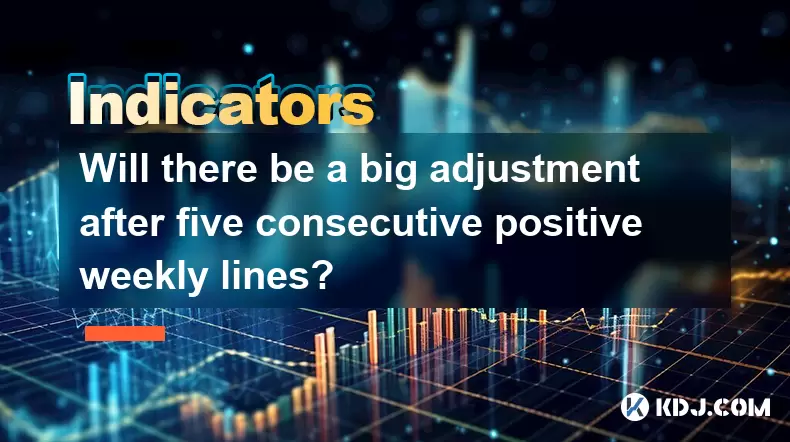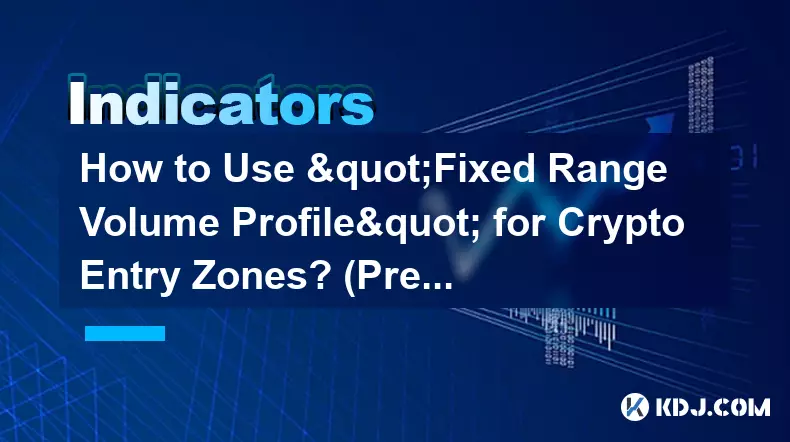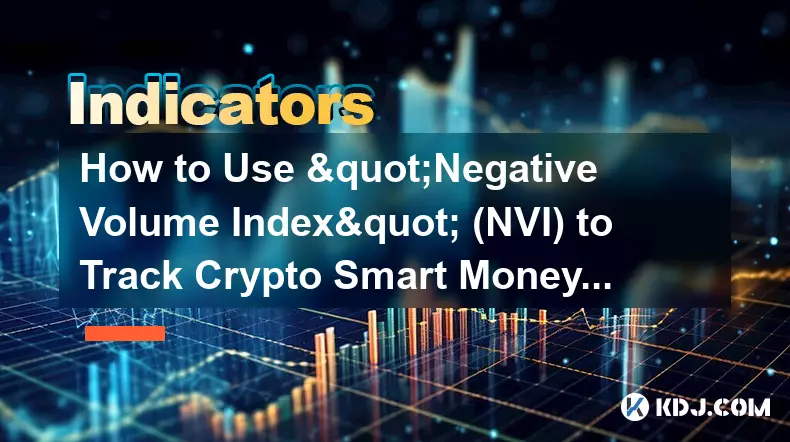-
 bitcoin
bitcoin $87959.907984 USD
1.34% -
 ethereum
ethereum $2920.497338 USD
3.04% -
 tether
tether $0.999775 USD
0.00% -
 xrp
xrp $2.237324 USD
8.12% -
 bnb
bnb $860.243768 USD
0.90% -
 solana
solana $138.089498 USD
5.43% -
 usd-coin
usd-coin $0.999807 USD
0.01% -
 tron
tron $0.272801 USD
-1.53% -
 dogecoin
dogecoin $0.150904 USD
2.96% -
 cardano
cardano $0.421635 USD
1.97% -
 hyperliquid
hyperliquid $32.152445 USD
2.23% -
 bitcoin-cash
bitcoin-cash $533.301069 USD
-1.94% -
 chainlink
chainlink $12.953417 USD
2.68% -
 unus-sed-leo
unus-sed-leo $9.535951 USD
0.73% -
 zcash
zcash $521.483386 USD
-2.87%
Will there be a big adjustment after five consecutive positive weekly lines?
A five-week crypto bullish streak often signals strong momentum but may precede a pullback, as seen historically with Bitcoin and Ethereum.
Jun 21, 2025 at 07:22 am

Understanding the Significance of Five Consecutive Positive Weekly Lines
In cryptocurrency trading, a five-week bullish streak is considered a rare and significant event. This pattern indicates sustained buying pressure and strong market confidence over an extended period. Historically, such occurrences have often been followed by a consolidation phase or a pullback. However, it's crucial to understand that this isn't a guaranteed rule but rather a statistical tendency.
The green candlestick patterns across five weeks reflect a consistent upward movement in price without major corrections. In technical analysis, this kind of momentum can lead to overbought conditions, especially if accompanied by high volume and rapid price increases. When assets become overbought, they often experience a profit-taking phase, which may result in a temporary downward adjustment.
Historical Precedents in Cryptocurrency Markets
Looking at Bitcoin’s historical data, there have been several instances where five or more consecutive green weekly candles were followed by a correction. For example, during late 2017's bull run, after a similar pattern emerged, the market saw a sharp decline in early 2018. Similarly, Ethereum experienced a similar trend in mid-2021 before entering a consolidation phase.
However, it's important to note that not all bullish streaks end in bearish reversals. Some markets continue their upward trajectory due to fundamental changes like increased adoption, regulatory clarity, or macroeconomic support. Therefore, while history provides useful context, it should not be used as a sole predictive tool.
Technical Indicators That May Signal an Adjustment
Traders can monitor certain technical indicators to gauge whether a pullback is imminent after a long bullish streak:
- RSI (Relative Strength Index): If RSI climbs above 70, it signals overbought territory.
- MACD (Moving Average Convergence Divergence): A bearish crossover might indicate weakening momentum.
- Volume Analysis: Declining volume during continued price gains could suggest waning interest.
- Fibonacci Retracement Levels: These help identify potential support zones during a correction.
By combining these tools, traders can better assess whether the current uptrend is sustainable or likely to face resistance and enter a corrective phase.
Market Sentiment and External Factors Influencing Corrections
Cryptocurrency markets are highly sensitive to sentiment and external news. Even with a strong technical setup, negative developments such as regulatory crackdowns, exchange outages, or macroeconomic shifts can trigger a sudden sell-off. Conversely, positive news like ETF approvals or institutional adoption can prolong the bullish phase.
Social media trends, particularly on platforms like Twitter and Reddit, also play a role in shaping short-term sentiment. The fear and greed index for cryptocurrencies can provide insight into whether the market is overly optimistic or pessimistic, which may influence whether a correction occurs.
How to Trade Around a Potential Pullback
If you're considering how to position yourself ahead of a possible adjustment, here are some strategies:
- Take Partial Profits: Sell a portion of your holdings to lock in gains while keeping exposure.
- Set Stop-Loss Orders: Protect your capital by placing stop-losses just below key support levels.
- Hedge with Options or Futures: Use derivatives to hedge against downside risk without exiting your position.
- Diversify Across Assets: Reduce concentration risk by spreading investments across different crypto projects or asset classes.
It's also wise to maintain a watchlist of altcoins that may outperform during a Bitcoin pullback, allowing you to rotate positions strategically.
Frequently Asked Questions
Q: Can a cryptocurrency sustain a bullish trend beyond five weeks?Yes, many cryptocurrencies have maintained bullish trends for extended periods, especially during strong bull cycles. Sustained adoption, favorable regulation, and macroeconomic factors can extend such trends.
Q: How reliable are technical indicators in predicting pullbacks?While technical indicators offer valuable insights, they are not infallible. Market psychology and unexpected events can override technical signals, so it's best to use them in conjunction with other analysis methods.
Q: Should I panic-sell if the market starts correcting?Panic selling is generally discouraged unless you're facing margin calls or have specific risk thresholds. Corrections can present buying opportunities for long-term investors who believe in the underlying value of the asset.
Q: What is the difference between a correction and a bear market?A correction typically refers to a short-term price drop of 10% to 20% from recent highs. A bear market, on the other hand, is characterized by a prolonged decline of 20% or more lasting months or even years.
Disclaimer:info@kdj.com
The information provided is not trading advice. kdj.com does not assume any responsibility for any investments made based on the information provided in this article. Cryptocurrencies are highly volatile and it is highly recommended that you invest with caution after thorough research!
If you believe that the content used on this website infringes your copyright, please contact us immediately (info@kdj.com) and we will delete it promptly.
- UAE Investor Secures Major Stake in Trump-Linked Crypto Firm Amidst Shifting Geopolitical Tides
- 2026-02-02 07:10:01
- Pepe Meme Coin: Navigating the Hype, Price Predictions, and Future Outlook in 2026 and Beyond
- 2026-02-02 07:05:01
- Blockchain Gaming's Quiet Revolution: Unpacking Latest Trends and Industry Insights Amidst Market Shifts
- 2026-02-02 06:30:01
- IPO Genie, Tokenization, and YouTubers: The Big Apple's Next Big Bet on Democratized Wealth
- 2026-02-02 06:40:02
- Aptos in a Bind: Downtrend Deepens, But a Brief Relief Bounce Looms Before the Next Plunge
- 2026-02-02 07:00:01
- Pi Network, ATL, and Community: Navigating the Currents of a Mobile-First Crypto Movement
- 2026-02-02 07:00:01
Related knowledge

How to Use "Dynamic Support and Resistance" for Crypto Swing Trading? (EMA)
Feb 01,2026 at 12:20am
Understanding Dynamic Support and Resistance in Crypto Markets1. Dynamic support and resistance levels shift over time based on price action and movin...

How to Use "Fixed Range Volume Profile" for Crypto Entry Zones? (Precision)
Feb 01,2026 at 10:19pm
Understanding Fixed Range Volume Profile Mechanics1. Fixed Range Volume Profile (FRVP) maps traded volume at specific price levels within a defined ti...

How to Identify "Symmetry Triangle" Breakouts in Altcoin Trading? (Patterns)
Feb 01,2026 at 01:39pm
Symmetry Triangle Formation Mechanics1. A symmetry triangle emerges when price action consolidates between two converging trendlines—one descending an...

How to Use "Negative Volume Index" (NVI) to Track Crypto Smart Money? (Pro)
Feb 01,2026 at 02:40am
Understanding NVI Mechanics in Crypto Markets1. NVI calculates cumulative price change only on days when trading volume decreases compared to the prio...

How to Spot "Absorption" in Crypto Order Books? (Scalping Technique)
Feb 01,2026 at 08:39pm
Understanding Absorption Mechanics1. Absorption occurs when large buy or sell orders repeatedly appear and vanish at the same price level without trig...

How to Use "Percent Price Oscillator" (PPO) for Crypto Comparison? (Strategy)
Feb 01,2026 at 01:59am
Understanding PPO Mechanics in Volatile Crypto Markets1. The Percent Price Oscillator calculates the difference between two exponential moving average...

How to Use "Dynamic Support and Resistance" for Crypto Swing Trading? (EMA)
Feb 01,2026 at 12:20am
Understanding Dynamic Support and Resistance in Crypto Markets1. Dynamic support and resistance levels shift over time based on price action and movin...

How to Use "Fixed Range Volume Profile" for Crypto Entry Zones? (Precision)
Feb 01,2026 at 10:19pm
Understanding Fixed Range Volume Profile Mechanics1. Fixed Range Volume Profile (FRVP) maps traded volume at specific price levels within a defined ti...

How to Identify "Symmetry Triangle" Breakouts in Altcoin Trading? (Patterns)
Feb 01,2026 at 01:39pm
Symmetry Triangle Formation Mechanics1. A symmetry triangle emerges when price action consolidates between two converging trendlines—one descending an...

How to Use "Negative Volume Index" (NVI) to Track Crypto Smart Money? (Pro)
Feb 01,2026 at 02:40am
Understanding NVI Mechanics in Crypto Markets1. NVI calculates cumulative price change only on days when trading volume decreases compared to the prio...

How to Spot "Absorption" in Crypto Order Books? (Scalping Technique)
Feb 01,2026 at 08:39pm
Understanding Absorption Mechanics1. Absorption occurs when large buy or sell orders repeatedly appear and vanish at the same price level without trig...

How to Use "Percent Price Oscillator" (PPO) for Crypto Comparison? (Strategy)
Feb 01,2026 at 01:59am
Understanding PPO Mechanics in Volatile Crypto Markets1. The Percent Price Oscillator calculates the difference between two exponential moving average...
See all articles










































































